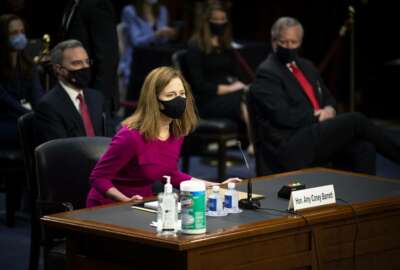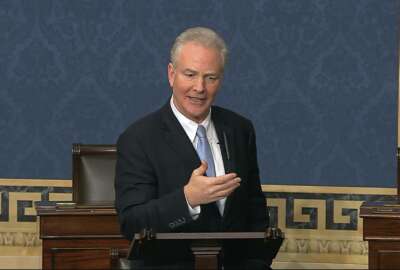
All eyes on the Senate, will any other work get done?
The Senate is almost totally occupied with Amy Coney Barrett, President Trump's nominee to the Supreme Court, but this debate also crowds out other important...
Best listening experience is on Chrome, Firefox or Safari. Subscribe to Federal Drive’s daily audio interviews on Apple Podcasts or PodcastOne.
The Senate is almost totally occupied with a topic of just six syllables: Amy Coney Barrett, President Trump’s nominee to the Supreme Court. Important as this debate is, though, it crowds out other important business in a compressed time period. Federal Drive with Tom Temin got a look ahead from WTOP Capitol Hill Correspondent Mitchell Miller.
Interview transcript:
Tom Temin: And this all got underway yesterday, Mitchell, and what can we expect coming up?
Mitchell Miller: Well, it’s only going to get tougher over the next few days. Yesterday was largely an outline of what we’re going to see over the next few days, with a lot of the lawmakers Democrat and Republican stating both of their sides as they go into figuring out exactly, I think we all know how the vote is going to go, which is course a party line vote. Democrats, interestingly enough, are kind of trying to dance around a little bit of the issues related to Amy Coney Barrett herself. They don’t want to attack her directly. So they’ve been talking very, very much about the fact that the Affordable Care Act will be coming up for oral arguments just a week after the election. And while talking about her past judgments, and – the indication that she might vote against it really raising that as a major concern for Americans. And that’s been a big part of the Democratic strategy. On the Republican side they’re saying, look, if she’s a highly qualified judge, why can’t we approve her and there were many references, in fact, to past confirmation battles, including Ruth Bader Ginsburg, which was not really a battle at all, pointing out that more than 90 senators voted for her confirmation. And the same was true of her good friend – even though she was on the opposite side of things legally – Antonin Scalia. So some of the lawmakers lamenting the fact that those days are obviously long gone. But we’re really going to start to really see some tough questioning over the next couple of days.
Tom Temin: Sure, as Justice Roberts said, we’re not supposed to have Obama judges or Bush judges are Trump judges, but just justices and judges.
Mitchell Miller: Exactly.
Tom Temin: I guess they can say it. And meanwhile, there is other business because well, the week is short, but also the period is short before the election and the CR comes after the election. So how does that all wrap up?
Mitchell Miller: Well, this, as you pointed out, this is really crowding out the fact that the stimulus package is still hanging over Congress, as it has been literally for months. And we keep getting these little teases here and there that it might be happening. Well, the talks are continuing, obviously a lot of wild things happened last week where the president pulled the plug on the talks completely, or at least he wanted to. And then other people said, no, you need to keep them going. And then only days later said he wanted a bigger package than Republicans or Democrats wanted. So over the weekend, there was a lot of back and forth. And the White House has come up with its numbers and they keep increasing it a little bit by bit. Now close to $1.8 trillion. Still not quite where Democrats wanted, House Speaker Nancy Pelosi basically saying they’re going one step forward, two steps back. And then of course, on the Republican side, the Senate Republicans really don’t have any appetite for anything that’s close to $2 trillion. So while the president has gone back and forth on this issue a lot, actually, many Senate Republicans, rather, have been pretty consistent. And Senate Majority Leader Mitch McConnell has indicated that they are not going to go ahead with a big package like that. So the fact that these hearings are now underway, there’s really no way to fully tackle that issue, other than continue to have these daily, off-and-on talks between House Speaker Nancy Pelosi and Treasury Secretary Mnuchin. I just don’t see any way that this is going to get done before election day.
Tom Temin: It’s almost like watching guests at the backdrop of a play sitting at a table in a restaurant or something – they’re silently chatting away while the script is going on downstage at the Supreme Court nomination hearings. And will that take all week?
Mitchell Miller: Yes, it’s gonna take most of the week. I mean, they will basically flush out the entire week. And that leaves little time for anything to happen other than the confirmation hearings, and essentially, the Senate Judiciary Committee Chairman Lindsey Graham has said he wants to get a committee vote by Oct. 22. And then that would put a vote by the full Senate probably the last week of October, of course, that would just be days before the election and because of the way the Senate calendar is that literally does not really leave any room for what would be a major vote. Obviously, if you’re talking close to $2 trillion related to the stimulus and pandemic relief, and even some Republican lawmakers kind of preempted this and just said there’s just not enough time to do this. Now on the Democratic side. Of course, they say just the opposite. They say, well, here’s a huge looming issue related to the country and the health and welfare of Americans and millions of Americans are still out of work. Businesses are failing. How can you put all of your energy on these confirmation hearings for a Supreme Court nominee when this is taking place? But that is the political dynamic we find ourselves in.
Tom Temin: We’re speaking with Mitchell Miller, Capitol Hill correspondent for WTOP. And a couple of parochial issues, Sen. Van Hollen has a bill regarding the tax deferral, COVID-related, that the Trump administration has imposed on federal employees.
Mitchell Miller: That’s right. This has been a struggle, as we know, for the last couple of months and Maryland Sen. Chris Van Hollen, along with many other Senate Democrats has really been trying to do something about this so that people don’t get a little bit of a – effectively a tax break, but then get walloped with getting to have to pay it next year. What he wants to do and what other lawmakers want to do is basically give the employees, federal workers and others have an option to opt out of this payroll tax deferral so that they won’t get hit with major taxes next year. So it’s really kind of dicey, though, about whether that’s going to move forward, because as we just talked about, a lot of these issues are getting pushed to the side, because there’s really literally no time for them on the Senate floor. Democrats argue that that the president just basically wants to show that he’s giving a break to federal workers and other employees ahead of the election. And they say that really the long term look, is this is not really going to help them as much as the president would like to say that it is.
Tom Temin: In practical terms, that bill could not become law before – first of all, the president would have to sign it – but would not become law before the tax deferral would be over and the payback period began.
Mitchell Miller: Right. Yeah, the whole calendar and all of the timing just really doesn’t work for anything to be reformed on this. But lawmakers are still trying to show that they’re plugging away on these kind of issues, even as this bigger picture takes place with the Supreme Court nomination, and everything else going on. They want to show before the election, that they are trying to do things to help American workers, frankly, even though it may not happen and probably won’t.
Tom Temin: And with the White House becoming something of a red hotspot for the COVID virus in recent weeks, what about Capitol Hill? Are they taking extra precautions at that end of Pennsylvania Avenue now?
Mitchell Miller: Well, it’s interesting related to the testing of members of Congress, as you know, there’s no regular daily testing for members of Congress, for staff, or members of the media here at the Capitol. And even during the Supreme Court nomination confirmation hearing yesterday, Sen. Sheldon Whitehouse [D-R.I.] said some things about testing like, do we even know about the people in this room, who has been tested and who has not been tested? And so there’s been a real push, and it’s coming from both Democrats and Republicans to say that there needs to be some kind of standardized testing for lawmakers, especially when you have more than 500 lawmakers, not to mention the thousands of staff members that are here when they’re in session. And so the House Speaker Nancy Pelosi and House Majority Leader Steny Hoyer, they have begun tentative talks about looking into what would be the possibility of this. As it stands now, if a lawmaker does feel that they have some type of conditions related to the virus, they can be tested. But overall, there is no regular testing. And some people just say the U.S. Capitol is effectively a petri dish, and that if you don’t do testing at some point, there could be a really much more widespread – spread of the virus. And in fact, it was only just yesterday that Utah Sen. Mike Lee was able to come back for this Supreme Court confirmation hearing after testing positive for COVID-19. Ironically, another senator who does not have COVID-19, Ted Cruz of Texas, he was actually entering in the hearing virtually because he felt he needed to self quarantine because he had been in contact with Sen. Lee. So a lot of different questions swirling around that, obviously, going back to what many suspect was a super spreader event involving Amy Coney Barrett and being introduced at the White House last month.
Tom Temin: Well, who knows they could come up with a program and then the members could have stickers that says “yo tested” or something.
Mitchell Miller: That’s right, just like “you voted,” right?
Tom Temin: All right. Mitchell Miller is Capitol Hill correspondent for WTOP, thanks so much.
Mitchell Miller: You bet.
Tom Temin: We’ll post this interview at FederalNewsNetwork.com/FederalDrive. Hear the Federal Drive on your schedule. Subscribe at Apple Podcasts or Podcastone.
Copyright © 2025 Federal News Network. All rights reserved. This website is not intended for users located within the European Economic Area.
Tom Temin is host of the Federal Drive and has been providing insight on federal technology and management issues for more than 30 years.
Follow @tteminWFED




